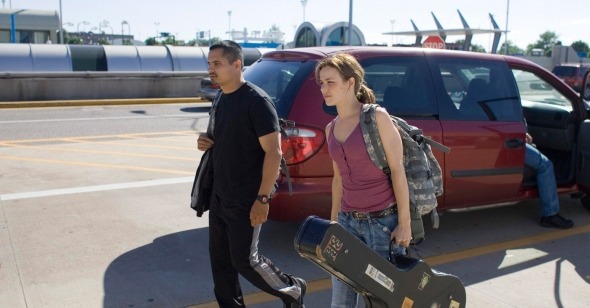The Surge
By Chris Wisniewski
The Lucky Ones
Dir. Neil Burger, U.S., Roadside Attractions
Maybe sometime in the next decade, the Iraq War will get its Platoon or its Full Metal Jacket, but for now, we’ll have to keep waiting for a memorably incisive, dramatically successful cinematic treatment—at least, from a fiction film (documentaries are, happily, another story). Neil Burger’s The Lucky Ones makes no effort to fill that void. Instead, it seems calculated to correct another, related problem: the anemic box-office of Iraq-themed films. The Lucky Ones flees from the ham-fisted, inelegant didacticism of In the Valley of Elah, Stop-Loss, and Redacted to more conventional and more marketable territory—in this case, the road-trip buddy picture. For Burger, Iraq is not so much the subject as the context, and The Lucky Ones is less Coming Home than Little Miss Sunshine with nicer wheels and army fatigues. It’s packaged to please, not to probe.
As The Lucky Ones opens, T.K. (Michael Pena) rides in a military vehicle with his fellow soldiers—it's the film's only scene actually set in Iraq—boasting about his sexual prowess; when fighting breaks out, a piece of shrapnel catches him in his penis. The irony is plain. After some recovery, T.K. begins a month-long leave and meets Colee (Rachel McAdams), also on leave, and Cheever (Tim Robbins), headed home for good after a falling port-o-potty causes a back injury, on a plane to New York. When this improbable threesome arrives stateside, all flights are canceled due to a blackout, so the three soldiers decide to share a rental car. Colee and T.K. are headed to Las Vegas—she to track down her late boyfriend Randy's parents, he to find an extremely talented sex worker to help him recover his ability to perform.
They drive first to St. Louis, where Cheever is reunited with his wife and son; she asks for a divorce within ten minutes of his arrival ("My friends told me I should have waited,” she admits, but snappy screenwriting has no room for realistically humane dawdling), and the son tells his dad he needs $20,000 in the next three weeks in order to hold his place at Stanford. Cheever decides to continue on to Vegas with the others to give his wife her space and win his son's Stanford tuition. Were this set-up not contrived enough, co-screenwriters Burger and Dirk Wittenborn keep piling on the absurdities, up to and including an actual tornado, while telegraphing the film’s emotional and narrative resolution. Amusing highway hi-jinks and meaningful detours will undoubtedly occur; three lonely people will indeed find solace in each other; and T.K.’s sexual potency will, of course, be restored.
The Lucky Ones heads in an obvious direction obviously, with almost every moment or ostensibly casual conversation pregnant with significance. Colee repeatedly mentions a burglary Randy perpetrated years ago, a clear enough indication that it will figure prominently in a later plot development. Cheever keeps citing that $20,000 Stanford price tag with exactitude, so remember that figure (also: have these people never heard of student loans?). In a speech about the effects of various spirits, T.K. explains that one should drink tequila only if one wants to go crazy. Any bets on a later tequila binge? The signposts are too conspicuous and the plot contortions too convenient—believability be damned. The Lucky Ones is unrelentingly writerly in a way that would be risible if not for the charming performances by Robbins, Pena, and especially McAdams, each of whom conveys both tender vulnerability and unpretentious warmth. Together, they’re endearingly watchable. And thanks to them, so, too, is The Lucky Ones.
Burger, who scored a surprise hit back in 2006 with The Illusionist, has defied expectation by turning in an Iraq movie with commercial appeal. In doing so, though, he has paid a political price. The Lucky Ones smoothes over and slides past any serious examination of the psychological and emotional impact of the war on its characters. Sure, they drink hard and pick fights and wake up in the middle of the night with a scream. They look askance at the Middle Eastern family driving in the car next to them. They wonder if they can really survive a return to the front. But Burger holds back, allowing these moments to recede into the background. He's made a nice and rather silly movie instead of making a probing one. It may be unfair to criticize this film for failing to be more serious-minded (it doesn't try to be), and one could certainly argue that The Lucky Ones is an improvement on some of its more earnest predecessors. Still, I couldn't shake a nagging feeling while watching The Lucky Ones that the soldiers fighting this war deserve something more than "How T.K. Got His Groove Back."
